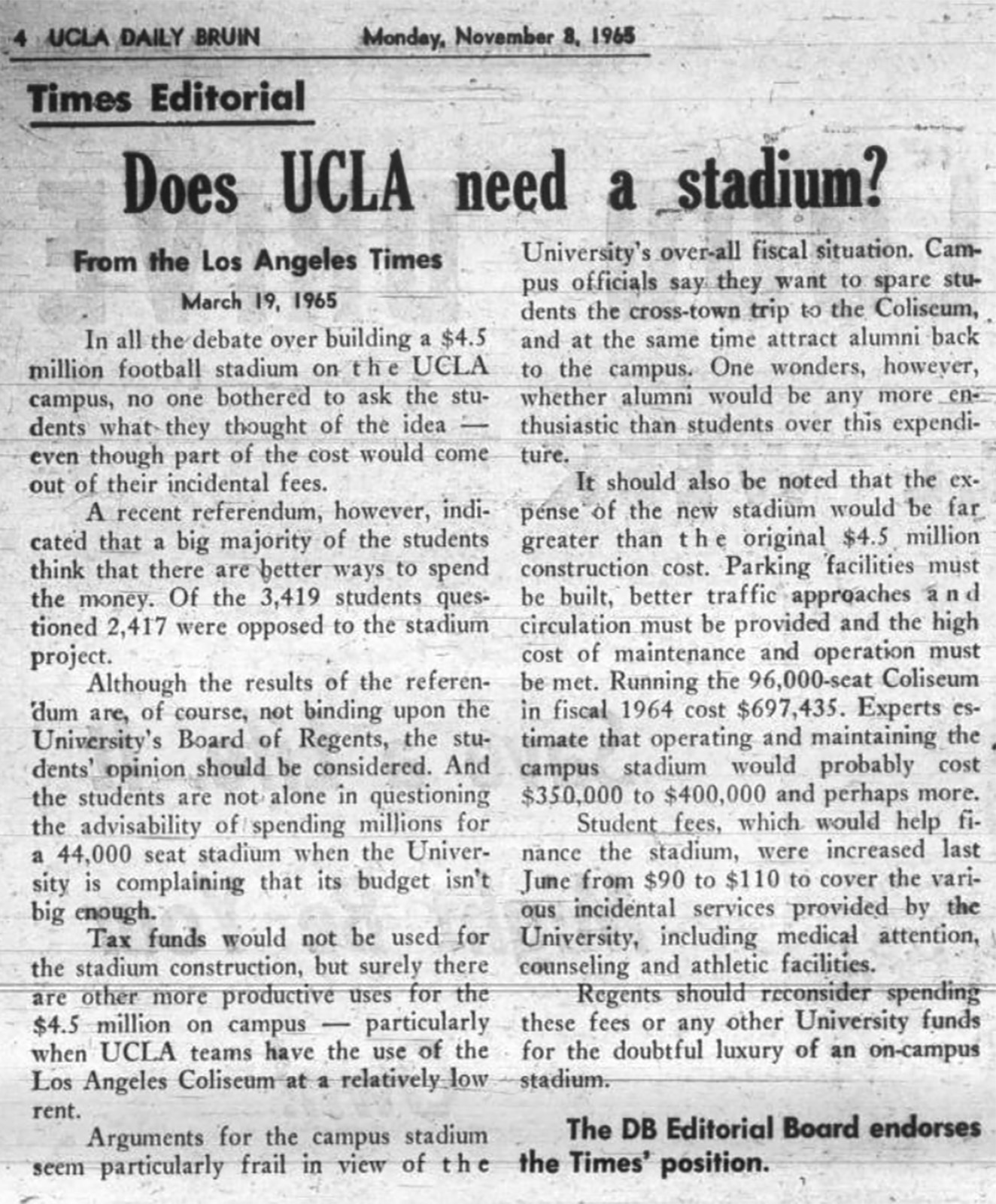Throwback Thursday: Petition in 1965 opposed using incidental fees to construct on-campus stadium

(Daily Bruin archive)
By Omar Said
Oct. 10, 2018 11:56 p.m.
Throwback Thursdays are our chance to reflect on past events on or near campus and relate them to the present day. Each week, we showcase and analyze an old article from the Daily Bruin archives in an effort to chronicle the campus’ history.
It’s week two, and the Bruins have already managed to lose five football games – their first five, no less.
With each loss, it becomes harder for students to justify going to games. The hourlong bus trip to the Rose Bowl is hardly worth it even when the Bruins have a chance at winning, and it’s understandable if students think Chip Kelly will only continue to crank out losses in the Bruins’ worst season since 1943. But in 1965, the university almost made a change that would have made going to games a far smaller commitment.
The unfortunate cross-city trip was almost solved by UCLA before it ever started. Back in November 1965, when UCLA still played its football games at the Los Angeles Memorial Coliseum, students were beginning to protest a new idea: The university was planning to use their precious tuition dollars to build a new football stadium on campus. Just as they do for basketball, students could have walked to football games.
The stadium would have cost about $6 million to build in 1965 – equivalent to about $48 million today – and students were deeply against it. They published a petition in the Daily Bruin, asking the chancellor’s office to decide against the stadium.
The issue was that the university planned to fund the stadium by charging students new incidental fees – the kind that adds up to your tuition bill. The Los Angeles Times wrote an editorial in March of 1965 against the stadium, which the Daily Bruin also printed in its pages that November. The editorial questioned whether students on campus really wanted to be paying for a new football stadium.
Students would go on to vote in a landslide referendum – a two-to-one majority – to scrap the stadium. Despite the nonbinding nature of the referendum, the students’ opinion was heard, and by February of 1966, the proposed football stadium had become a $1.5 million track stadium that became what we now know as Drake Stadium. Drake ended up taking about $12 million in today’s currency, making it the perfect project for UCLA at the time, which had a budget surplus – just not enough of one to fully support a football stadium.
So while the decision of students 53 years ago inadvertently led students to trek even further for football games, it set an important precedent for what kind of extravagances students were willing to pay additional fees for – and what UCLA would attempt to get students to pay for.
Drake Stadium hasn’t ever been used for the Bruins’ football games, but it has been home to a few scrimmages and football practices since its construction, as well as several concerts, ceremonies and track and field events.
Throughout the years, students at UCLA have managed to live their lives with football games being far away from home – after all, it means not having to pay for a new stadium. They’ve waited in long lines and taken trips on rooter buses to get to the Rose Bowl. They’ve been there for their team, tailgating and getting to games ahead of time. But the trip to the Rose Bowl can easily become less enticing when our team starts to seem a little more lackluster, like it does this season.
So yes, a football field next to the Student Activities Center would do wonders for students fatigued by having to take an hourlong bus to Pasadena.
But the real question is whether Bruins would be willing to open their wallets for UCLA’s 0-5 football team.

